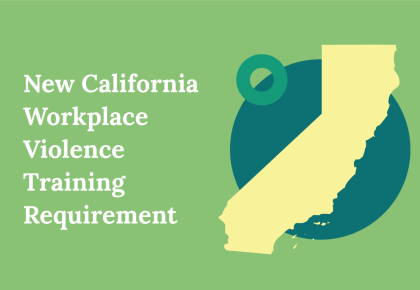Yes, You Can be Fired for Harassment
The Business Consequences of Workplace Harassment
Creating a safe and respectful workplace environment is crucial for the well-being and success of all employees. And it’s the responsibility of employers to protect employees from harassment. Federal law protects employees from harassment whether on the work premises or not. For example, you can get fired for sexual harassment if you proposition a coworker at a conference.
According to the U.S. Equal Employment Opportunity Commission (EEOC), harassment is unwelcome conduct that is based on race, color, religion, sex (including sexual orientation, gender identity, or pregnancy), national origin, older age (beginning at age 40), disability, or genetic information (including family medical history).
Harassment becomes unlawful where 1) enduring the offensive conduct becomes a condition of continued employment, or 2) the conduct is severe or pervasive enough to create a work environment that a reasonable person would consider intimidating, hostile, or abusive.
Unfortunately, incidents of workplace harassment continue to occur and can have severe consequences for both the victim and the perpetrator. It is important to note that these consequences serve to promote a culture of respect and protect the rights and dignity of all employees.
Terminated for Harassment
When an employee engages in any form of harassment, it can lead to severe consequences, including termination of employment. Companies have a legal and ethical responsibility to address harassment promptly and appropriately, which is a crucial aspect of maintaining that environment.
Ethics hotlines are an important tool for employees to report harassment and other inappropriate behaviors at work. Explore Syntrio’s whistleblower hotlines here.
Employers often provide anti-harassment training (such as Syntrio’s workplace harassment courseware), and policies and procedures in place to handle reports of harassment, and termination is considered a viable option in cases where the behavior is investigated, substantiated and deemed unacceptable.
What Happens if You Get Fired for Harassment?
- Loss of Employment: Individuals found guilty of harassment can face immediate termination, resulting in the loss of their job. Termination serves as a strong message from the employer that such behavior will not be tolerated, and it underscores the seriousness with which harassment is viewed in the workplace.
- Damage to Professional Reputation: Being fired for harassment can have long-term repercussions on an individual’s professional reputation. This can make it challenging to secure future employment, as potential employers may view such actions as a red flag in terms of character, compliance and ethics.
- Legal Consequences: Harassment can also have legal ramifications for the perpetrator. Victims of harassment may choose to pursue legal action, leading to potential lawsuits, financial penalties, and damage to personal finances. Employers can also face legal consequences for failing to address harassment effectively, as both state and federal laws require employers to do so.
The Impact on the Organization
- Empowering a Speak Up! Culture: When a harasser is terminated, it sends a powerful message to the victim that their complaints were taken seriously and their rights were prioritized. This can foster a sense of empowerment, encouraging victims to Speak Up! and report instances of harassment, knowing that action will be taken.
- Improved Work Environment: Removing a harasser from the workplace through termination creates a safer and more respectful environment for all employees. It reinforces the message that harassment will not be tolerated and sets a precedent for appropriate conduct, promoting a positive and inclusive company culture.
- Enhanced Employee Morale: Addressing harassment by terminating the offender demonstrates that the company values the well-being and dignity of its employees, partners and customers. This can boost employee morale, fostering a sense of trust, loyalty, and commitment to the organization.
What to Do When an Employee Harasses a Customer?
It is not uncommon for instances of harassment to involve customers or business partners. And that harassment has taken many forms, with very public repercussions. For instance, in 2018, a Starbucks employee was fired for writing a derogatory name on a customer’s cup. In 2019, a Walmart employee was fired for harassing a Muslim customer. In 2018, Sephora shut their stores for a day to hold diversity training when an employee harassed a black customer who was shopping for makeup.
Harassing a customer is a serious violation of the harassment policy and can lead to legal liability and loss of business for the employer. In such cases, it is important for companies to take swift and appropriate action to address the situation. Compliance hotlines are for customers and business partners, too. And people do use them. The steps to address any report of harassment usually include:
- Investigation: Just as with an employee report, the organization will conduct a thorough investigation into the incident, gathering all relevant information and evidence.
- Support the Victim: Organizations will likely offer support and resources to the victim, ensuring their well-being and providing guidance on the options available to them.
- Disciplinary Action: If the harassment is found to be substantiated, take appropriate disciplinary action against the employee, which may include termination, depending on the severity of the offense.
- Customer Management: The organization might implement measures to ensure the safety and well-being of customers, such as providing alternative services or limiting contact with the offending employee.
- Crisis Management: The organization may have to engage in public relations using crisis experts to ensure the public knows they’ve properly addressed the situation, while protecting the rights of all involved.
Connect with Syntrio for Anti-Harassment Training and Compliance Hotlines
Harassment, particularly sexual harassment, is a serious offense that can lead to termination of employment. Employers have a responsibility to create a workplace culture that prioritizes respect and safety through effective harassment training and compliance hotlines.
By swiftly and decisively addressing incidents of harassment – including termination when necessary – companies can foster an environment that values and protects all employees. This approach not only promotes employee well-being but also contributes to the success and reputation of the business as a great place to work.
Syntrio can be your partner in making your workplace a better place. Let’s connect.


